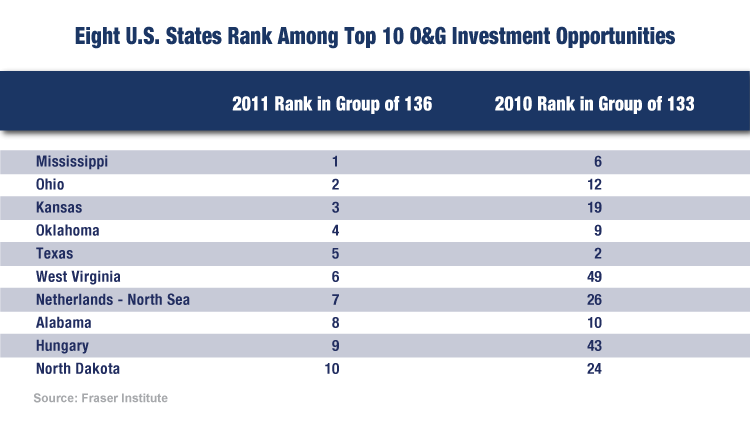
Eight U.S. states made the top 10 list of most attractive jurisdictions worldwide for oil and gas investment, according to Calgary-based Fraser Institute's Fifth Annual Global Petroleum Survey.
Mississippi, Ohio, Kansas, Oklahoma, Texas, West Virginia, Alabama and North Dakota made the top 10 of the All-Inclusive Composite Index; the Netherlands sector of the North Sea and Hungary also are among the top 10, the global policy think-tank reported. Only Mississippi, Texas, Oklahoma and Alabama ranked in the top 10 in the 2010 survey, and were also among the top 10 in 2009.
The states in the top 10 were deemed as having attractive commercial and regulatory climates, and were described by survey respondents as having stable and predictable regulatory framework, favorable corporate taxation systems and being energy-friendly with rich resources.
The least attractive countries for investment include Venezuela, Ecuador, Bolivia, Iran, Kazakhstan, Uzbekistan, Democratic Republic (Kinshasa), Iraq, Libya and Russia. The rankings are based on survey respondents' negative view of these jurisdiction's regulatory, fiscal and environmental regulations, labor availability and skills, quality of infrastructure, trade barriers, land claim disputes and legal system. "Petroleum-producing regions must offer investors competitive tax regimes and regulatory certainty," said Gerry Angevine, Fraser Institute senior economist in the Global Resource Center and co-author of the survey.
The U.S. Gulf of Mexico experienced one of the largest drops in the global rankings, plummeting to 60rh place overall after finishing 11th in the 2010 survey, which was conducted before the Deepwater Horizon oil leak. "The decline isn't surprising, given the greater difficult of obtaining drilling permits in the wake of the BP disaster," said Gerry Angevine.
Jurisdictions which experienced remarkable declines in their attractive investment this year include the Philippines, Uganda, Brunei, Uruguay, Angola, the Democratic Republic of the Congo (Kinshasa), Cameroon, Equatorial Guinea and offshore Alaska.
Unexpected changes to Uganda's taxation system signaled the government's lack of commitment to maintaining a stable policy environment. This lack of commitment was a key factor in Uganda's decline to 123rd place this year from 94th in 2010 in terms of investment attractiveness.
The Democratic Republic of the Congo (Kinshasa)'s ranking also declined to 130th this year from 106th last year. "The arbitrary revocation of exploration rights from one company, and their transfer to another party, likely shattered whatever trust would-be investor may have had in Kinshasa and its ability to administer petroleum industry regulations fairly," said Angevine.
Data was gathered from 502 respondents representing 478 companies on 17 factors covering 136 jurisdictions worldwide. These factors include fiscal terms; tax regime; uncertainty surrounding environmental regulations; uncertainty surrounding interpretation and enforcement of existing regulations; cost of regulatory compliance; uncertainty over what areas are protected wildlife, marine and archaeological sites; socioeconomic agreement and community development conditions; trade barriers; labor regulations; infrastructure quality; geological database quality; labor availability and skills; disputed land claims; political stability; security of personnel and assets; regulatory duplication and inconsistencies; and legal system.




No comments:
Post a Comment